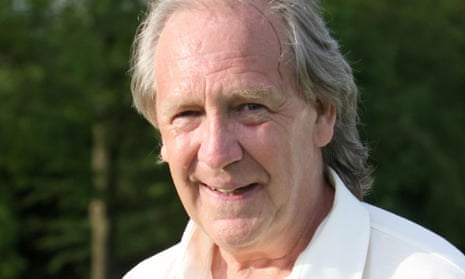In his heyday in the 1980s, Ian Botham became the first English cricketer to have an entourage: a gofer-cum-minder, a few select team-mates, fishing pals and even one or two trusted pressmen. There was also a court jester, a talkative fellow known to the gang as “Loon”.
This was David English, who has died aged 76 after a heart attack. He arguably did as much as anyone to promote cricket in England over the next 30-odd years, except perhaps Botham himself.
His achievements came in two guises, both using the name Bunbury, a private joke, but also promotion for Bunbury Tails, his series of children’s books involving rabbits based on real cricketers (that was turned into an animated TV show by Channel 4 in 1992).
English’s Bunbury XI played charity matches wherever there was a good cause that needed help. He had an astonishing array of contacts, and was utterly shameless in banging on at them until he got what he wanted, be it a donation or a celebrity appearance.
And in 1987 he took over an ailing tournament for under-15 boys run by the English Schools Cricket Association and infused it with his energy and outsize personality. Under his aegis, an annual cohort of four regional teams produced more than a hundred England cricketers.
English was born in London, to Joyce (nee Scoffin) and Kenneth English, a musician turned advertising executive who left home when David was a teenager. The boy went to eight different schools and began to make his name in good-standard cricket for Finchley, partly as a surprisingly dour left-handed batsman – in life he rarely played the forward defensive – but more so as a dressing-room raconteur and an after-dinner speaker.

This is an art which does not necessarily require adherence to the whole truth, and many who knew him well remain puzzled by aspects of his picaresque early life. Maybe, as recorded in his autobiography Mad Dogs and the Englishman (2002), he did, aged 19, snog Brigitte Bardot while her other half, Gunter Sachs, lurked nearby. And maybe he did teach Robert Redford to play cricket on the set of A Bridge Too Far, Richard Attenborough’s 1977 epic about the Battle of Arnhem.
But it is harder to believe he voluntarily gave up a job running the recording arm of the impresario Robert Stigwood’s empire, carrying the grand title of president, to take his chance as a bit-part actor.
True, he did appear in A Bridge Too Far, but he was not one of the stars who studded it. He claimed to have been given a line as a wounded paratrooper, telling Laurence Olivier: “My boots are full of blood”. But even he admitted that took him 17 takes and did not make the final cut. The peak of his acting career was a Head and Shoulders advert.
Rock and Hollywood’s loss was cricket and charity’s gain, though English’s sources of income thereafter were not obvious. But Stigwood’s two star turns, the Bee Gees and Eric Clapton, remained part of English’s wide circle.
In 1982 he began promoting celebrity-based six-a-side games at Finchley in aid of cricketers’ benefits. Then the Bunbury road show moved towards more pressing needs, drawing big crowds to watch, say, Clapton batting with a Cowdrey and Bill Wyman chain-smoking in the slips, on behalf of organisations such as Childline and Make a Wish.
In 2007 he ran a game in Suffolk for my own family charity, the Laurie Engel Fund. To the bafflement of spectators, an hour’s cricket involving the likes of the Test players Mark Ramprakash and Chris Silverwood, and Harry Judd of McFly, was followed by a two-hour lunchbreak, including a very eccentric memorabilia auction. But in due course a handsome cheque went off to our cause, Teenage Cancer Trust, and we were most grateful.
Perhaps most grateful of all were the Bunbury boys from the schools’ festivals. The graduates from that cricketing hothouse remembered not only the boost it gave their career but also the old-fashioned fun. The annual highlight was the trip to the nearest Nando’s for a night of English-led karaoke and japes, such as the teenage Ben Stokes pouring piri-piri into Joe Root’s Coca-Cola.
For his services to cricket and charity, English was appointed MBE in 2003, advanced to CBE in 2010. By 2018, his access to sponsorship began to fade and the event fell into the joyless hands of the England and Wales Cricket Board. But the day after he died, the England players in the World Twenty20 final wore black armbands in his honour.
He would have loved their triumph and the celebrations that followed. And the fact that they cared enough to mourn cricket’s own enigmatic master of the revels.
English married Robyn Dunckley in 1992; they divorced four years later. He is survived by their children, Amy and David Jr, and his partner, Lia Lanaja.

Comments (…)
Sign in or create your Guardian account to join the discussion